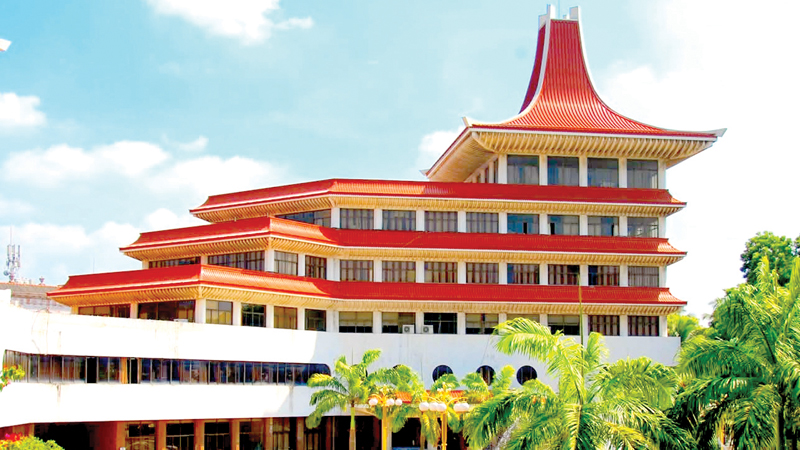 The death of an inmate at Boossa Prison in Galle last April has revived long-standing concerns over prison management, custodial violence, and the integrity of the country’s criminal justice system. In response, Justice and National Integration Minister Harshana Nanayakkara has ordered a full-scale investigation into the circumstances leading to the fatal incident. The deceased inmate, a 46-year-old male, reportedly succumbed to injuries sustained from multiple stab wounds inflicted by a fellow prisoner using a sharp object.
The death of an inmate at Boossa Prison in Galle last April has revived long-standing concerns over prison management, custodial violence, and the integrity of the country’s criminal justice system. In response, Justice and National Integration Minister Harshana Nanayakkara has ordered a full-scale investigation into the circumstances leading to the fatal incident. The deceased inmate, a 46-year-old male, reportedly succumbed to injuries sustained from multiple stab wounds inflicted by a fellow prisoner using a sharp object.
The deceased inmate, Nandakumar Shivanandan alias “Shiva” arrived at the Colombo High Court, Courtroom No. 7, on June 3, 2022, to appear in a case against him. After pleading guilty in the case, the High Court imposed a fine and a suspended sentence on Shiva. After the case was concluded, Shiva was allegedly illegally arrested by officers of the Police Narcotics Bureau within the court premises itself while he was on his way home. At the time of his arrest, Shiva did not have any drugs in his possession, nor did he have his mobile phone. His wife said that she witnessed the arbitrary arrest within the premises following which Shiva was pushed into a vehicle and driven away. Sources claim that Shiva was held in a carpark down Malwatta Road, Colombo 12 before being taken to his house in Gothatuwa at around 8.30 pm where the same officers allegedly found 1 ½ kg of heroine in a cupboard.
According to the officers themselves, the four eldest children and the suspect’s wife were also present in the Gothatuwa house when they went to Gothatuwa. However, despite accepted protocol, no statement was recorded from any of them regarding the search nor the findings. The CCTV footage was presented to the Maligakanda Magistrate’s Court on behalf of the suspect, shows that no such drugs were found and that the story told by the Police Narcotics Bureau officers is false.
In the face of such facts, the Police Narcotics Bureau produces the suspect before the court and obtains a detention order. According to the detention order, the suspect is taken to an abandoned juice bar on the main road in Kohilawatte, saying that he received another phone call while in the custody of the Police Narcotics Bureau, and a cache of drugs were found near a lampost near the juicebar. The Police Narcotics Bureau officers charge the suspect with the same quantity of drugs and file a case.
On several occasions when this case was scheduled to be heard before the High Court, the witness number 01 of the complaint, Police Inspector Pathum Kumara, who is said to have carried out the raid and the arrest, did not appear before the court to give evidence. As a result, the trial was delayed day by day and on April 4, Shiva was stabbed to death by another inmate at the Boossa Prison.
The incident has now escalated beyond an isolated act of prison violence, triggering widespread debate on both the immediate security failures at Boossa Prison, one of the country’s most tightly guarded high-security facilities. and the deeper systemic flaws plaguing Sri Lanka’s entire correctional and criminal justice apparatus.
Two parallel investigations launched
The Ministry of Justice said that two separate investigations are already under way: one led by the Sri Lanka Police and the other conducted by the Department of Prisons. The spokesperson for the Prisons Department, Gamini Dissanayake told the Sunday Observer that special attention has been given to this case, as Boossa is a high-security prison and is the first time such an incident had occurred within the Boossa prison premises. “A conflict outside the prison could create an opportunity for individuals to confront one another in a compact area such as a prison. And these inmates can be pretty creative in making a weapon out of the most harmless items. He said that a broken plate, a plastic toothbrush, a piece of barbed wire or even a stone. We’ve found all these being used as weapons in the past from various prisons,” said Dissanayake. He also said that the concluding report of the prison inquiry will not only investigate the facts but will be making comprehensive recommendations aimed at preventing similar incidents in the future.
Justice Minister Nanayakkara’s directive also includes the establishment of a special committee composed of senior ministry officials and legal experts. This committee, which was set up following the requests of the Sri Lanka Bar Association (BASL), has been tasked with conducting a full review of the prison’s internal security protocols, inmate management systems, and administrative procedures.
Anatomy of the attack
While both investigations are still ongoing, preliminary reports suggest that the murder may have links to either a drug-related conflict or tensions that arose from a recent raid within the prison compound. According to prison officials, the victim sustained injuries at 11 separate points on his body, raising further concerns about how such a violent confrontation was able to occur within a supposedly secure facility.
The authorities are also investigating whether this incident is part of a broader pattern of organised crime activities that continue to operate from within Sri Lanka’s prison system. Raids conducted at the Boossa Prison over the past year have uncovered contraband including narcotics, mobile phones, and other illicit items that are believed to fuel internecine conflicts among inmates.
A senior police officer involved in the investigation, speaking on the condition of anonymity said, “Control over narcotics networks inside prisons has long been a catalyst for violent outbreaks. This case may be no different.”
BASL raises alarm over custodial deaths
The Bar Association of Sri Lanka (BASL) has strongly weighed in on the incident, connecting the Boossa murder to a wider crisis of custodial deaths and prison violence that has plagued Sri Lanka for years.
In a strongly worded letter addressed to Acting Inspector General of Police Priyantha Weerasuriya, the BASL highlighted its deep concern over recurring incidents of deaths and violence involving detainees and suspects in State custody.
“It is our considered view that one principal cause for this continuing problem could well be the lack of adequate awareness and knowledge on Fundamental Rights and Liberties of the Citizens, which have also been amply explained in several recent decisions of the apex Courts,” the BASL letter stated.
The BASL has further proposed a roundtable discussion between the Sri Lanka Police and the Association to address the issue of fundamental rights training for law enforcement officers. The Association believes that a lack of institutional awareness regarding suspects’ rights significantly contributes to the current crisis in custodial safety.
Highlighting the joint responsibility to reform the justice system and prevent further deaths in custody, the BASL called upon the Ministry of Justice for collaborative reforms that would prevent future custodial deaths.
Drug law reforms under scrutiny
The Boossa incident also draws uncomfortable attention to recent legal reforms that some experts say may be indirectly contributing to overcrowding and prolonged pre-trial detention, both of which fuel tensions within the prison walls. The BASL had previously flagged concerns regarding the Poisons, Opium and Dangerous Drugs (Amendment) Act No. 41 of 2022, which transferred bail jurisdiction for drug-related offences from Provincial High Courts to the Court of Appeal.
In a separate letter sent to Justice Minister Nanayakkara in April 2025, the BASL warned that this amendment has created substantial obstacles for litigants and exacerbated prison overcrowding. The BASL said that the creation of exclusive jurisdiction of the Court of Appeal has resulted in access to justice being made more cumbersome for litigants who are now compelled to seek recourse in Colombo, irrespective of where the offence was committed.
The Association said that this situation, coupled with significant delays in receiving Government Analyst Reports, has directly contributed to the increase in remand detainees facing drug-related charges. The growing population of such detainees further strains prison resources and heightens the potential for violence.
The BASL’s Executive Committee has officially requested that the Government revisit the controversial amendment and restore bail jurisdiction back to the Provincial High Courts, saying that doing so would help reduce pressure on the prison system while improving access to justice for vulnerable defendants. “It is problematic. If someone from Jaffna was to be taken in, they have to come to Colombo to get bail. It is about a matter of logistics,” the President of BASL, Attorney-at-Law Rajeev Amarasuriya told the Sunday Observer.
He also said that the IGP’s response in addressing this issue has been positive and will be holding a round table discussion in the coming weeks. “We (BASL) have shown zero tolerance on this. Let it be police brutality or safety in prison. Once you are in State custody you are in State custody and the State has a responsibility to your safety,” he said.
A system at breaking point
The Ministry of Justice and the Department of Prisons have accepted that overcrowding, staff shortages, poorly maintained facilities, and limited rehabilitation programs have all contributed to an environment where violence among inmates can escalate with deadly consequences.
As of early 2025, Sri Lanka’s total prison population stands at approximately 29,000, with many facilities operating well over capacity. Remand prisoners constitute nearly 50 percent of the total inmate population, a situation that local and international human rights organisations have consistently criticised.
The Human Rights Commission of Sri Lanka (HRCSL) has also expressed concerns about systemic failures to ensure the safety and rights of individuals held in State custody. In several reports, the HRCSL has called for urgent structural reforms, greater accountability mechanisms, and robust training programs for prison officials and law enforcement officers.
While Minister Nanayakkara’s swift response to the Boossa incident has been welcomed by many, including the BASL, there is mounting public and institutional pressure for these investigations to yield more than temporary attention. Legal analysts said that this moment could serve as a critical turning point for prison reform in Sri Lanka if the Government chooses to act decisively.
For now, the official investigations continue, while the committee appointed by Minister Nanayakkara is expected to present its recommendations in the coming weeks. The police and the Department of Prisons have assured the public that their inquiries will be thorough, transparent, and impartial.
But as the country watches, yet another custodial death make headlines, while foreign inmates are slipping through the fingers of prison officials to give testimonies to foreign media outlets, many are left wondering how many more such tragedies it will take before Sri Lanka delivers the long-promised overhaul of its deeply troubled prison and justice system.






